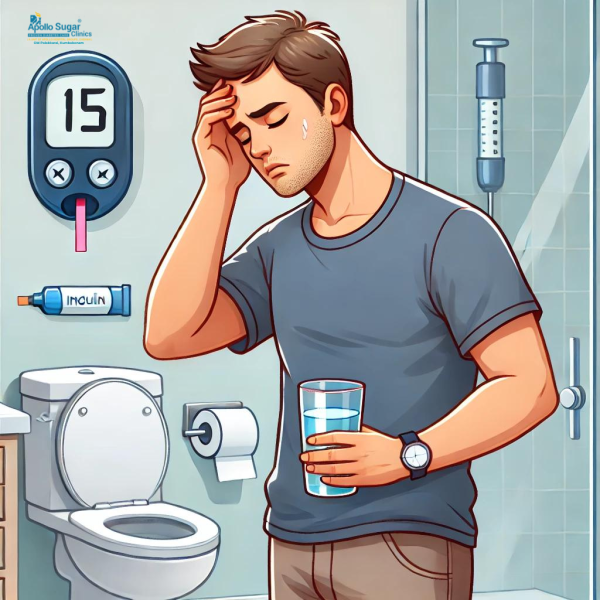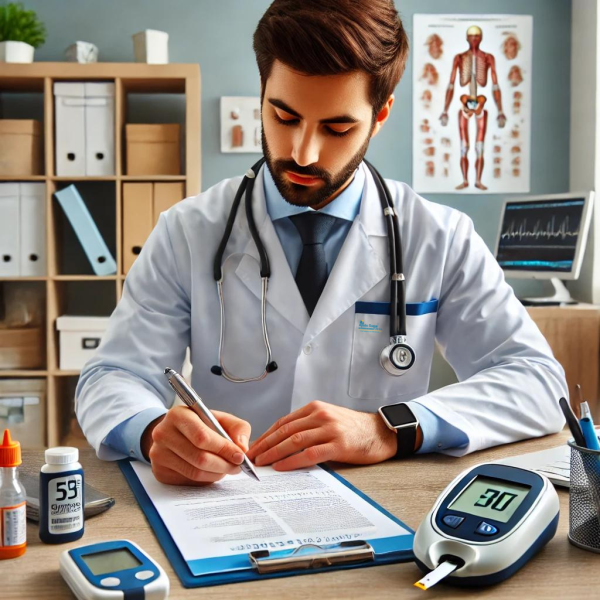Hyperglycemia Symptoms
Hyperglycemia Symptoms: Understanding and Managing High Blood Sugar Levels

Introduction
Are you or a loved one dealing with hyperglycemia in your daily life? Managing hyperglycemia is crucial for maintaining your overall health and well-being. At Apollo Sugar Clinics, we specialize in providing comprehensive care and effective treatments for hyperglycemia to help you live a healthy, balanced life.

Understanding Hyperglycemia
What Is Hyperglycemia?
Hyperglycemia occurs when there is an excessive amount of glucose (sugar) in the blood. It can cause various symptoms, including frequent urination, increased thirst, and fatigue. Hyperglycemia is commonly associated with diabetes but can also occur in individuals without diabetes due to factors such as stress, illness, or certain medications.
Symptoms of Hyperglycemia
- Frequent Urination: Increased urination is a common symptom as the body attempts to remove excess sugar through urine.
- Increased Thirst: Due to frequent urination, dehydration can occur, leading to persistent thirst.
- Fatigue: High blood sugar levels can interfere with the body’s ability to utilize glucose for energy, causing fatigue.
- Blurred Vision: Excess sugar can affect the lenses in your eyes, causing blurred vision.
- Headaches: Elevated blood sugar levels can lead to headaches due to dehydration and other metabolic imbalances.
Hyperglycemia Treatments
Immediate Treatments
If you experience symptoms of hyperglycemia, immediate action is required to manage it. Here are some quick treatments:
- Hydrate: Drink plenty of water to help flush out excess sugar through urine.
- Exercise: Physical activity can help lower blood sugar levels by increasing insulin sensitivity.
- Adjust Medication: Consult your healthcare provider to adjust your insulin or other diabetes medications as needed.
Long-Term Management
Long-term management of hyperglycemia involves understanding the underlying cause and making necessary lifestyle adjustments:
- Healthy Diet: Focus on a balanced diet with controlled carbohydrate intake to manage blood sugar levels.
- Regular Monitoring: Keep track of your blood sugar levels with regular monitoring to catch any spikes early.
- Medication Adherence: Take your prescribed medications consistently and as directed by your healthcare provider.
Our Approach to Hyperglycemia Treatment in Kumbakonam
Comprehensive Assessment
During your initial visit, our experienced healthcare professionals will conduct a thorough assessment to understand your medical history, current health status, and specific needs. This may include blood tests and other evaluations.
Personalized Treatment Plan
Based on your assessment, we will develop a personalized treatment plan tailored to your unique needs. This plan may include dietary recommendations, exercise plans, and medication adjustments.
Ongoing Support and Monitoring
We provide continuous support and monitoring to ensure your treatment plan is effective. Regular follow-up appointments and consultations help us track your progress, make necessary adjustments, and provide guidance to manage your condition effectively.
Why Choose Apollo Sugar Clinics?
- Expertise and Experience: Our team of skilled healthcare professionals specializes in diabetes and hyperglycemia management, ensuring you receive the best care possible.
- Patient-Centered Care: Your comfort and well-being are our top priorities. We strive to provide personalized care that addresses your specific needs and concerns.
- Advanced Technology: We use the latest medical technology and equipment to provide accurate diagnoses and effective treatments.
- Comprehensive Services: In addition to hyperglycemia treatment, we offer a wide range of diabetes care services to support your overall health.

BOOK YOUR APPOINTMENT TODAY!
If you or a loved one is experiencing symptoms of hyperglycemia, schedule a consultation with us at Apollo Sugar Clinics in Kumbakonam. Our friendly and knowledgeable staff is here to help you achieve stable blood sugar levels and improve your quality of life.
F.A.Q

Hyperglycemia is a condition characterized by an excessive amount of glucose (sugar) in the blood. It commonly occurs in people with diabetes but can also affect those without diabetes due to factors like stress, illness, or certain medications.
Common symptoms include:
- Frequent urination
- Increased thirst
- Fatigue
- Blurred vision
- Headaches
Hyperglycemia is diagnosed through blood tests that measure glucose levels. A fasting blood sugar level of 126 mg/dL or higher or a random blood sugar level of 200 mg/dL or higher may indicate hyperglycemia.
If you experience symptoms, it’s important to:
- Drink plenty of water to stay hydrated.
- Engage in physical activity to help lower blood sugar levels.
- Check your blood sugar levels frequently.
- Consult your healthcare provider for advice on medication adjustments.
Long-term management strategies include:
- Following a healthy diet with controlled carbohydrate intake.
- Regularly monitoring blood sugar levels.
- Taking medications as prescribed by your healthcare provider.
- Maintaining a regular exercise routine.
Yes, if left untreated, hyperglycemia can lead to serious complications such as:
- Diabetic ketoacidosis (DKA)
- Hyperosmolar hyperglycemic state (HHS)
- Long-term damage to organs, including the eyes, kidneys, nerves, and heart
